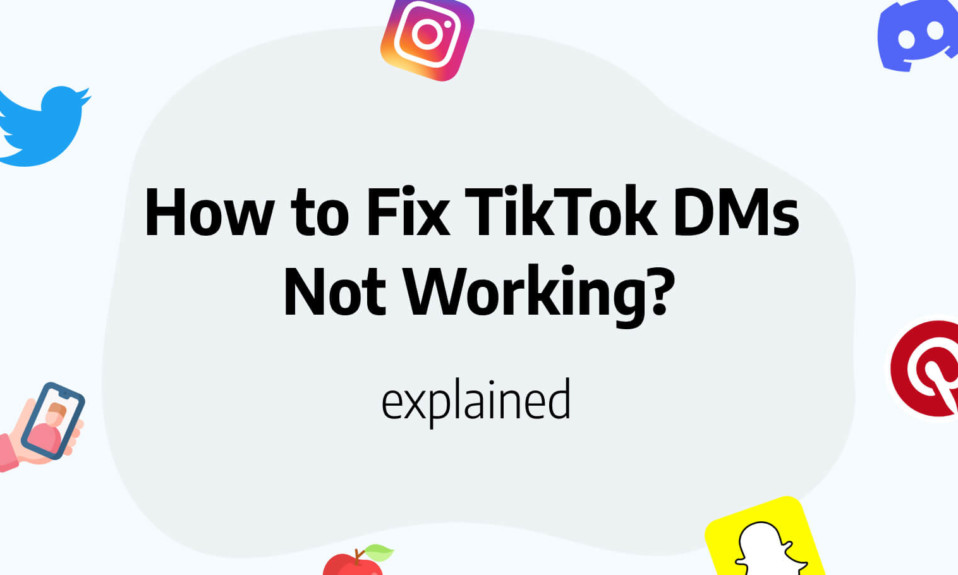Navigating the intricate maze of construction projects is no small feat, but with the right tools, the blueprint to success becomes clearer.
Harnessing the capabilities of 16 project management software designed specifically for the construction industry can transform chaotic sites into models of efficiency and precision.
If you’re on the lookout for robust solutions to streamline workflows and enhance collaboration, dive into the digital revolution that’s reshaping the way we build.
Optimized for the keyword “en“, each tool in this lineup is engineered to elevate your construction management game.
Top 16 Project Management Software For Construction
monday.com
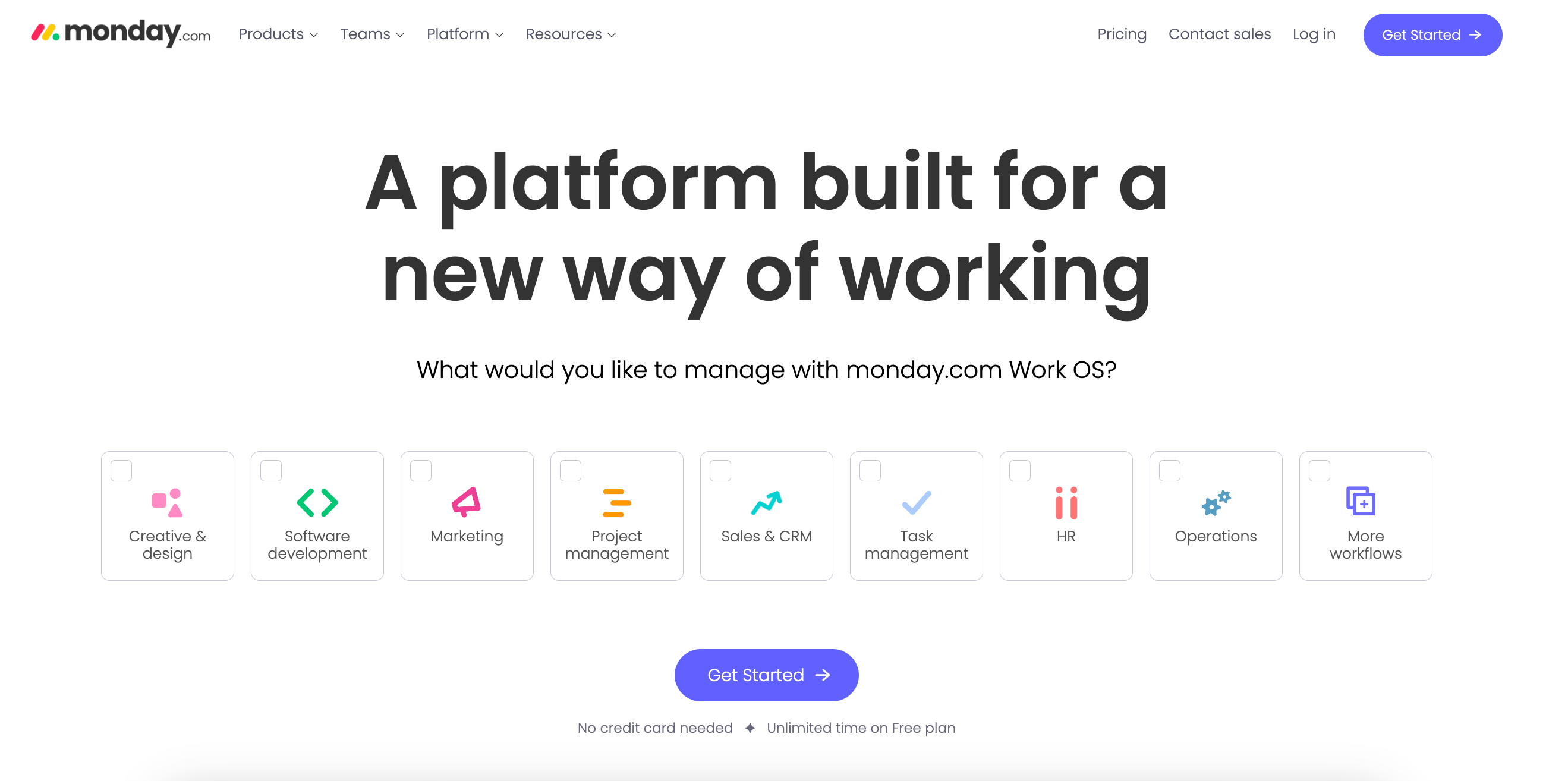
Our team values its visual interface that transforms complex project data into easily digestible and actionable insights.
With a rich array of features, ranging from task scheduling, tracking, and time management to resource allocation and budget oversight, monday.com stands out for its ability to streamline the multifaceted facets of construction projects.
Moreover, its customizable workflows empower our team to create a tailor-made project management ecosystem that perfectly aligns with our unique construction processes.
Robust collaboration tools also enhance communication across various stakeholders, ensuring everyone is in sync, whether on the job site or in the office.
Pros:
- Intuitive and visually appealing interface that enhances user experience and lowers the learning curve
- Highly customizable workflow enabling the adaptation to diverse construction project needs
- Real-time updates and collaboration features keep all team members aligned and informed
- Integration capabilities with various tools to centralize project management processes
- Powerful analytics and reporting that provide insightful overviews for decision-making
Cons:
- Can be pricey for smaller construction firms with limited budgets
- May offer more features than needed for simple projects, which can overwhelm users
- Initial setup requires time investment to customize platforms to specific construction needs
For who?:
monday.com is an ideal solution for construction managers, teams, and companies looking for a comprehensive and scalable project management software for construction.
Whether our projects are large-scale commercial endeavours or smaller residential builds, monday.com’s modular design accommodates the distinct aspects of various construction projects.
It serves both teams in the field and back-office professionals, catering to the collaborative and administrative demands of construction project management.
By providing a central hub for all project details, monday.com empowers us to maintain oversight and control, ultimately driving project success.
Scoro
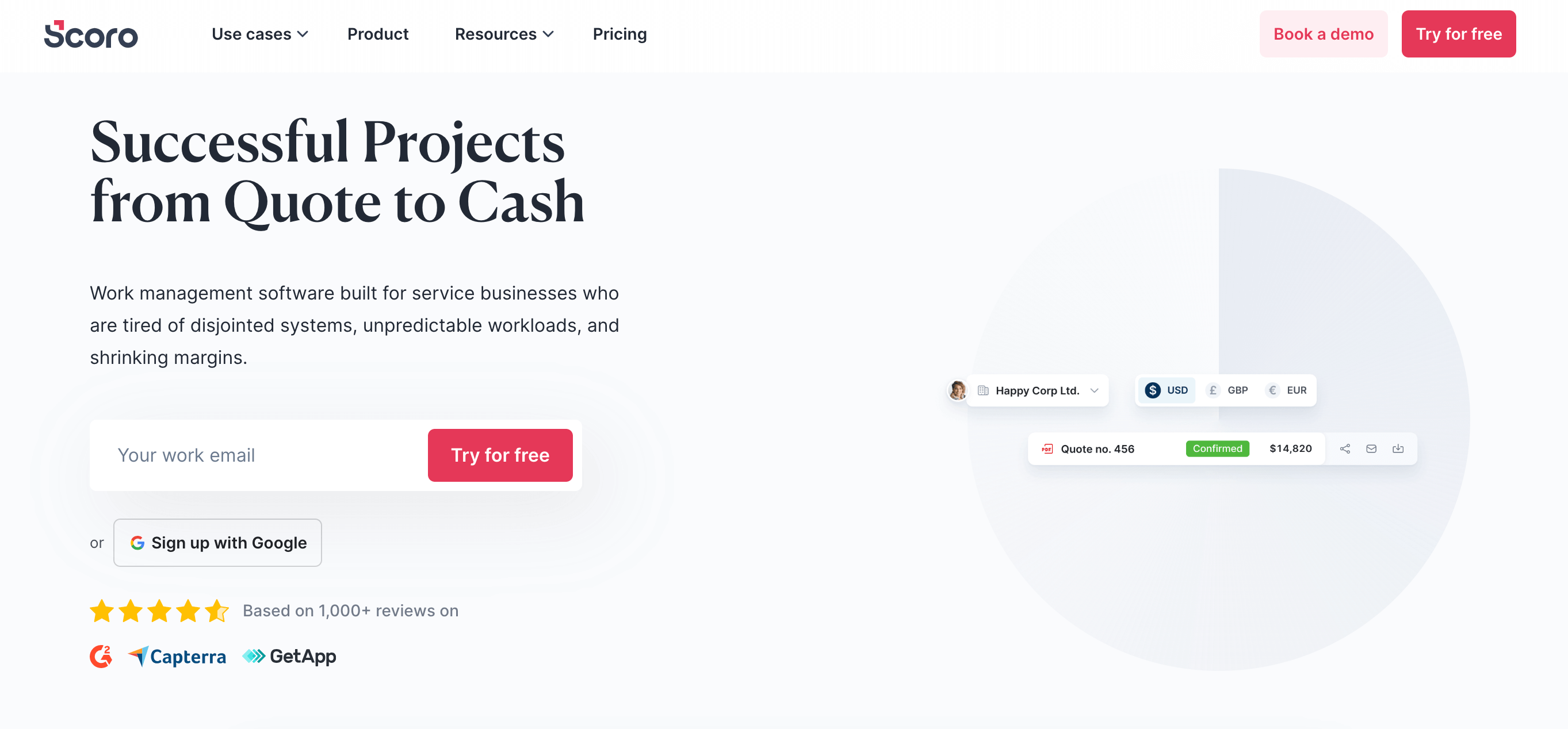
It acts as a central hub that streamlines workflows and integrates various aspects of a project such as time tracking, billing, and reporting into a singular, user-friendly interface.
Our team finds great value in its real-time dashboard that provides a clear overview of project progress and KPIs, facilitating informed decision-making.
Scoro’s versatility allows us to customize the software to suit our unique construction project requirements, making our project planning, resource allocation, and financial forecasting more efficient.
Their collaboration tools foster seamless communication among our team members, encouraging synergy and productivity even while handling multiple construction sites.
Pros:
- Real-time dashboard for an overarching view of projects
- Comprehensive integration capabilities with popular software
- Strong focus on time management and billing features
- Customization options for various construction workflows
- In-depth reporting tools to analyze project performance
Cons:
- May have a steep learning curve for new users
- Higher cost compared to some other options
- Limited third-party integrations in certain niche construction areas
For who?:
Scoro is an excellent choice for construction firms and project managers who prioritize a blend of functionality and customizability in their project management software for construction.
It is especially suited for those wanting to oversee all aspects of project management within a single platform.
Moreover, construction businesses that require detailed reporting and analytical tools will find Scoro highly beneficial for tracking their project’s financial health and operational efficiency.
Although it’s a premium option, for us, the investment is justified by the breadth of features and the ability to streamline our entire project management process under one roof.
Microsoft Project
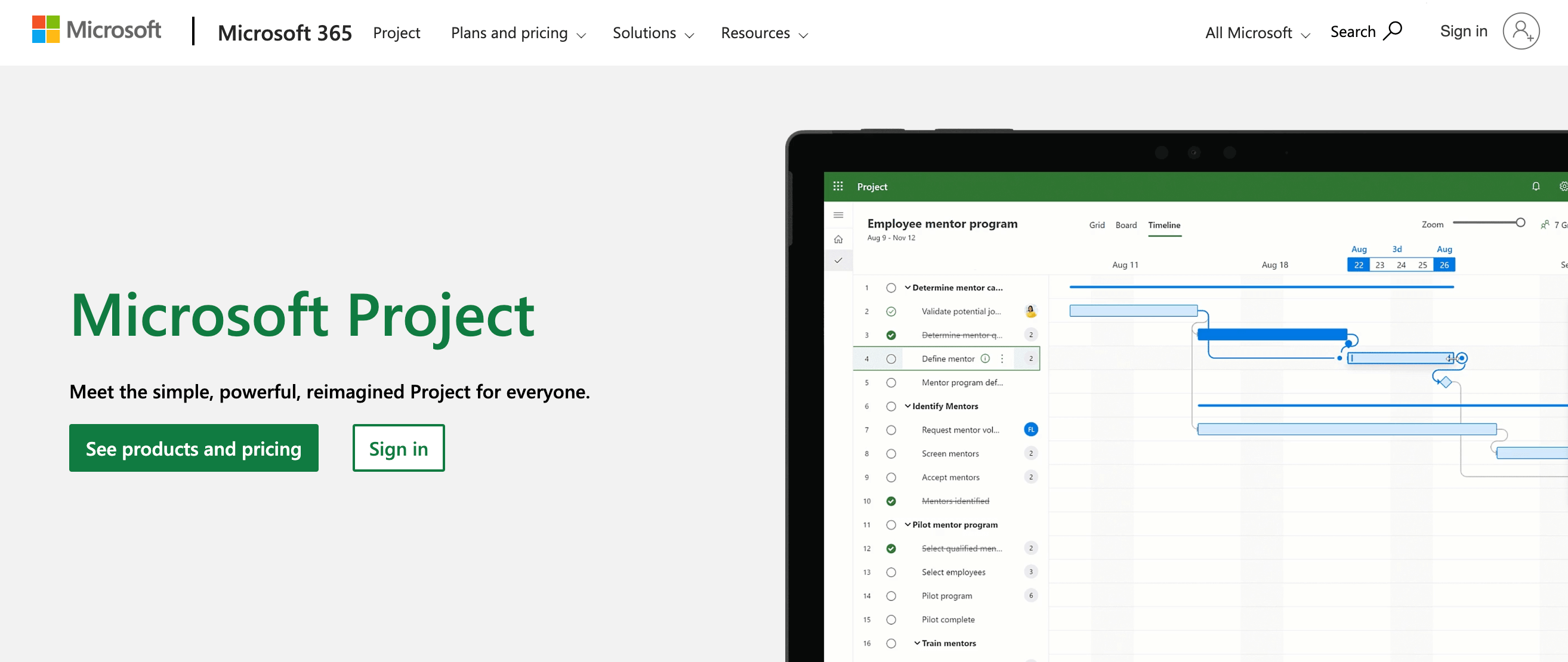
Within our arsenal, Microsoft Project stands out as a robust tool designed to tackle the multifaceted challenges that surface in the construction industry.
It adeptly serves as a central command center, facilitating resource allocation, task scheduling, and critical path analysis with precision.
Its interface, while densely packed with features, offers Gantt charts, budget analysis, and custom reporting capabilities, equipping us with the insights necessary to make informed decisions.
The software deftly integrates with other Microsoft applications as well as numerous third-party tools, ensuring seamless data interchange and enhancing our collaborative efforts across various project stages.
Pros:
- Rich scheduling features that accurately reflect project timelines
- Resource management tools for optimal allocation and utilization
- Customizable reporting for tracking progress and financials
- Integration capabilities with Microsoft 365 suite and other software
- Advanced features for tracking compliance with industry standards
Cons:
- A steep learning curve for new users due to complex functionality
- Can be cost prohibitive for small firms or individual contractors
- Limited collaboration features when compared to some competitors
For who?:
Microsoft Project is an ideal choice for construction project managers and teams who require an exhaustive set of tools to oversee complex projects.
It serves well for larger construction firms and experienced project managers who will no doubt benefit from its advanced project scheduling and resource management.
Microsoft Project is particularly valuable for those who are already entrenched within the Microsoft ecosystem and can harness the full spectrum of its integration capabilities.
For those prepared to invest the time and resources into mastering this solution, it offers a powerful ally in delivering construction projects on time and within budget, embodying a keystone of modern project management software for the construction sector.
Notion

We see it as a powerhouse of organization — a unified workspace where you can write, plan, collaborate, and get organized with ease.
It effortlessly blends notes, tasks, wikis, and databases to create an all-in-one workspace for a variety of projects, including those in construction.
By allowing us to tailor our workflows, we can track progress across huge projects, lay out timelines, and maintain formidable checklists to ensure no bolt is left untwisted.
With Notion, the integration of media, web content, and docs make it seamless for us to aggregate all project aspects into one visually appealing interface, forging a crystal-clear overview of our construction ventures.
Our tasks, from the foundational groundwork to the final architectural touches, find a structured space within Notion.
Pros:
- Highly customizable workspace suitable for various project sizes and types
- Integrated task management with to-do lists and kanban boards
- Easy to collaborate in real-time, enhancing team communication and efficiency
- Consolidates multiple tools into one platform, reducing the need for separate software
- Offline functionality keeps us productive even on remote construction sites
Cons:
- Comes with a learning curve due to its vast array of features and customization options
- Mobile app experience is sometimes inconsistent with the web/desktop version
- Lack of native time-tracking features could necessitate additional tools or integrations for detailed time management
For who?:
Notion is ideal for construction teams seeking a customizable project management tool to streamline their processes.
It’s particularly beneficial for our project managers and team leaders who need to keep tabs on the multitude of tasks that construction projects demand.
Whether our teams are collaborating on-site or from different locations, Notion’s robust capabilities cater to the dynamic and multifaceted nature of construction projects.
Small to mid-sized firms will find Notion’s flexibility and scalability essential for growth.
However, larger enterprises might need to evaluate if Notion’s broad toolset aligns with their complex and specific project management needs in the construction industry.
Favro
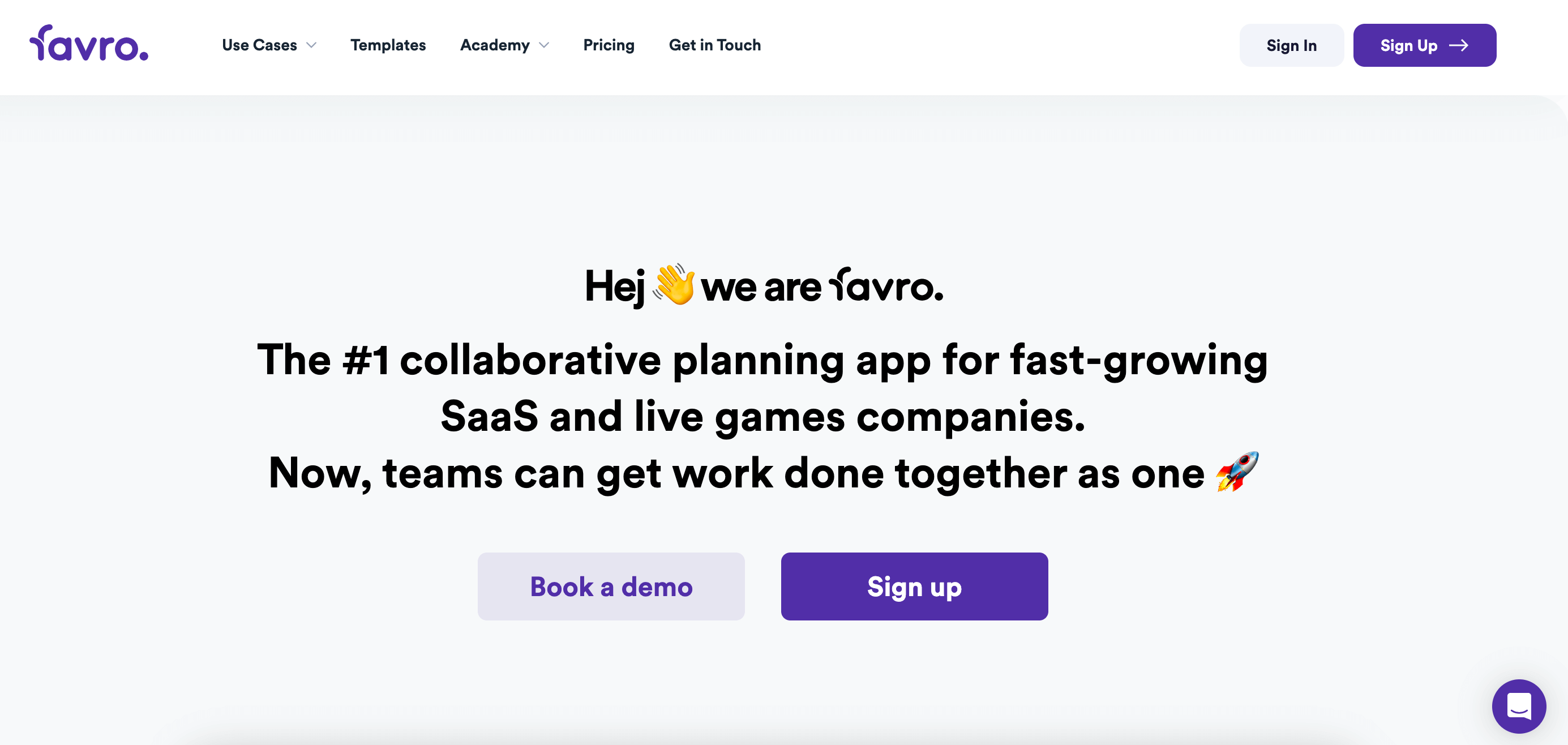
With its flexible interface, it allows us to streamline our construction project workflows and foster collaboration among all stakeholders.
Favro stands out with its card and board system, which we can customize to replicate our construction process stages.
This system helps us visualize task progress and manage resources effectively.
Additionally, the platform’s ability to integrate with a variety of other tools ensures that we centralize our communication and documentation, greatly reducing the risk of costly errors.
Pros:
- Highly customizable boards and cards adapt to various construction project needs
- Enhances team collaboration in real-time across multiple locations
- Integration capabilities with other software tools reduce data silos
- Reporting features provide insights into project performance
- Comes with a mobile app to ensure updates from the field are instant and seamless
Cons:
- The interface may have a learning curve for users unfamiliar with agile methodologies
- Might be overwhelming for small teams that require simpler solutions
- Can be considered costly for smaller organizations with tight budgets
For who?:
Favro is particularly suited for construction project managers and teams who are looking for robust and scalable project management software for construction.
It’s designed for those who strive for efficiency, transparency, and adaptability in managing multiple, complex construction projects.
Whether we’re overseeing residential builds or commercial developments, Favro equips us with the tools to handle the full project lifecycle – from planning to execution to closeout.
It’s an ideal solution for teams that are ready to embrace a digital transformation in their project management practices and are in need of a system that supports both the granular details and the big-picture strategy.
Workfront
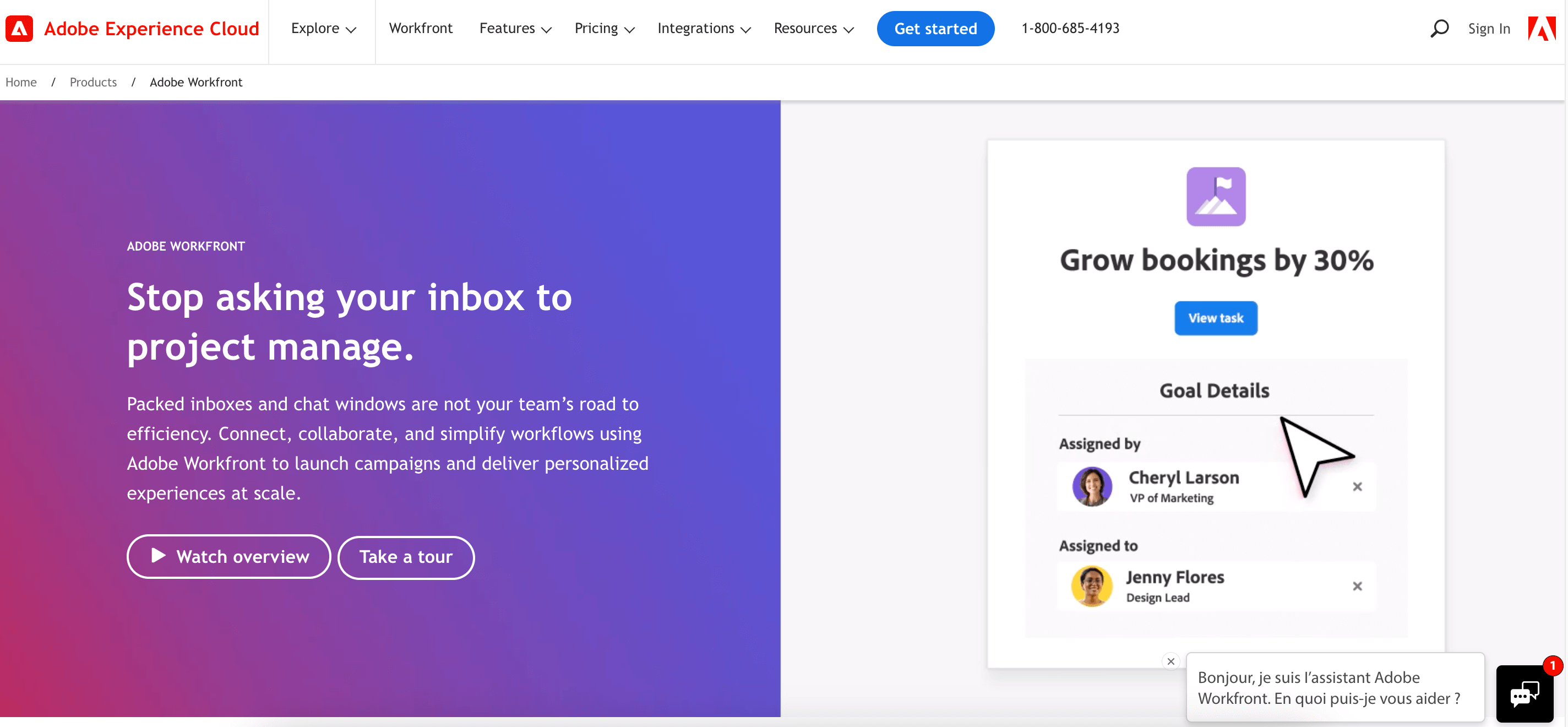
It adeptly fuses traditional project management tools with robust work automation and customizable workflows, ensuring that all our team members stay aligned with real-time insights and integrated task management.
Workfront’s interface provides us with a singular view into the various stages of our construction projects, from planning through to execution and final delivery, allowing us to nimbly adjust to changes in project scope or deadlines.
The platform’s adaptability to other software systems means we can seamlessly integrate it within our technological ecosystem, enhancing our data visibility and informed decision-making.
Pros:
- Dynamic project visualization tools, aiding in efficient workflow mapping
- Tailored project dashboarding for strategic oversight
- Sophisticated resource management, enhancing manpower and budget allocation
- Extensive integration capabilities with other systems (e.g., CRM, ERP)
- Real-time collaboration features, fostering team communication
Cons:
- Can be overwhelming for new users due to its extensive features
- Tailored mainly for larger organizations, which means it might be cost-prohibitive for smaller teams
- Learning curve involved in fully mastering the utilisation of its features
For who?:
Workfront is tailor-made for construction project teams needing a robust, integrated solution that can handle complex, multifaceted projects.
As project managers in the construction field, we often juggle a plethora of detailed tasks, from tracking project timelines and budgets to managing a diverse workforce and collaborating with multiple stakeholders.
The scalability and advanced features of Workfront make it perfect for us to stay on top of every aspect of our projects, ensuring we deliver on time, within budget, and to the satisfaction of our clients.
For companies seeking a top-tier project management software for construction that offers a wide range of tools and a flexible platform, Workfront stands as a solid contender.
Redbooth
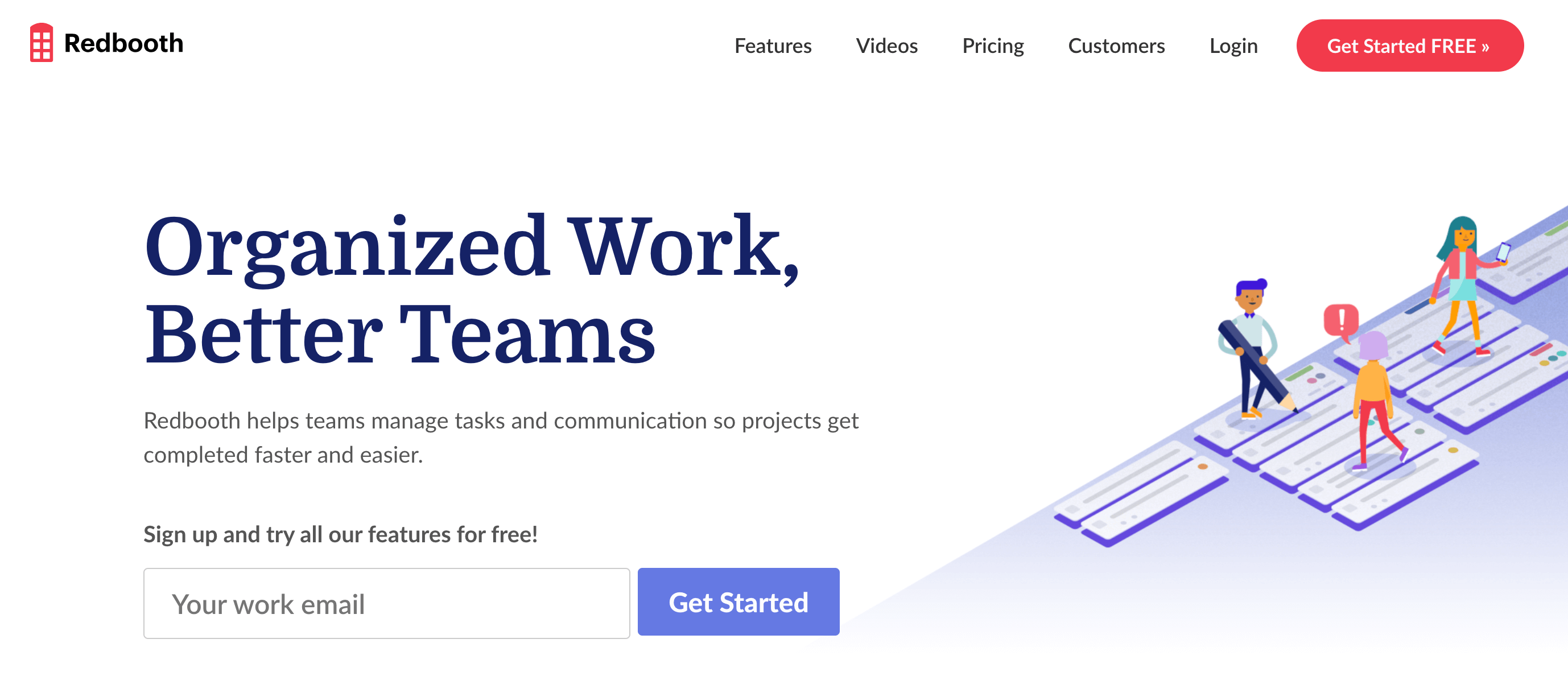
With a user-friendly interface, we can effortlessly create, assign, and track tasks, ensuring every project milestone is met on schedule.
Redbooth offers us a centralized space for document sharing, task management, and time-tracking, which is invaluable for keeping complex construction projects organized.
Its visual project timelines and Gantt charts enable us to anticipate project needs and allocate resources effectively.
Integration with popular tools such as Dropbox, Google Drive, and Slack enhances our capability to maintain a seamless workflow, which is particularly crucial for the unique demands of construction project management.
Progressing from planning to execution, Redbooth ensures that we keep all stakeholders informed and projects on track, expanding our ability to handle multiple projects with varying scopes and timelines.
Pros:
- User-friendly interface that simplifies task management
- Visual timelines and Gantt charts enhancing project planning
- Centralized document sharing, aiding in efficient information dissemination
- Time-tracking features to monitor project deadlines and labor hours
- Seamless integration with commonly used tools such as Dropbox and Slack
- Encourages team collaboration and clear communication, reducing project errors
Cons:
- May have a learning curve for those new to digital project management tools
- Limited customization options for reports
- Higher pricing tiers required to unlock all advanced features
For who?:
Redbooth’s project management solutions are perfectly tailored for construction managers, site supervisors, and project teams looking to elevate their project delivery process to new heights of efficiency and accuracy.
Whether it’s a small renovation or a large-scale infrastructure build, our platform adapts to the complexities and dynamic nature of construction projects.
The real-time collaboration assisted by Redbooth makes it an excellent fit for construction professionals seeking to mitigate risk, stay within budget, and achieve timely completion of their projects.
It’s a tool that suits growing construction firms ready to adapt to cutting-edge project management practices as much as it benefits established companies aiming to refine their project execution strategies.
ActiveCollab
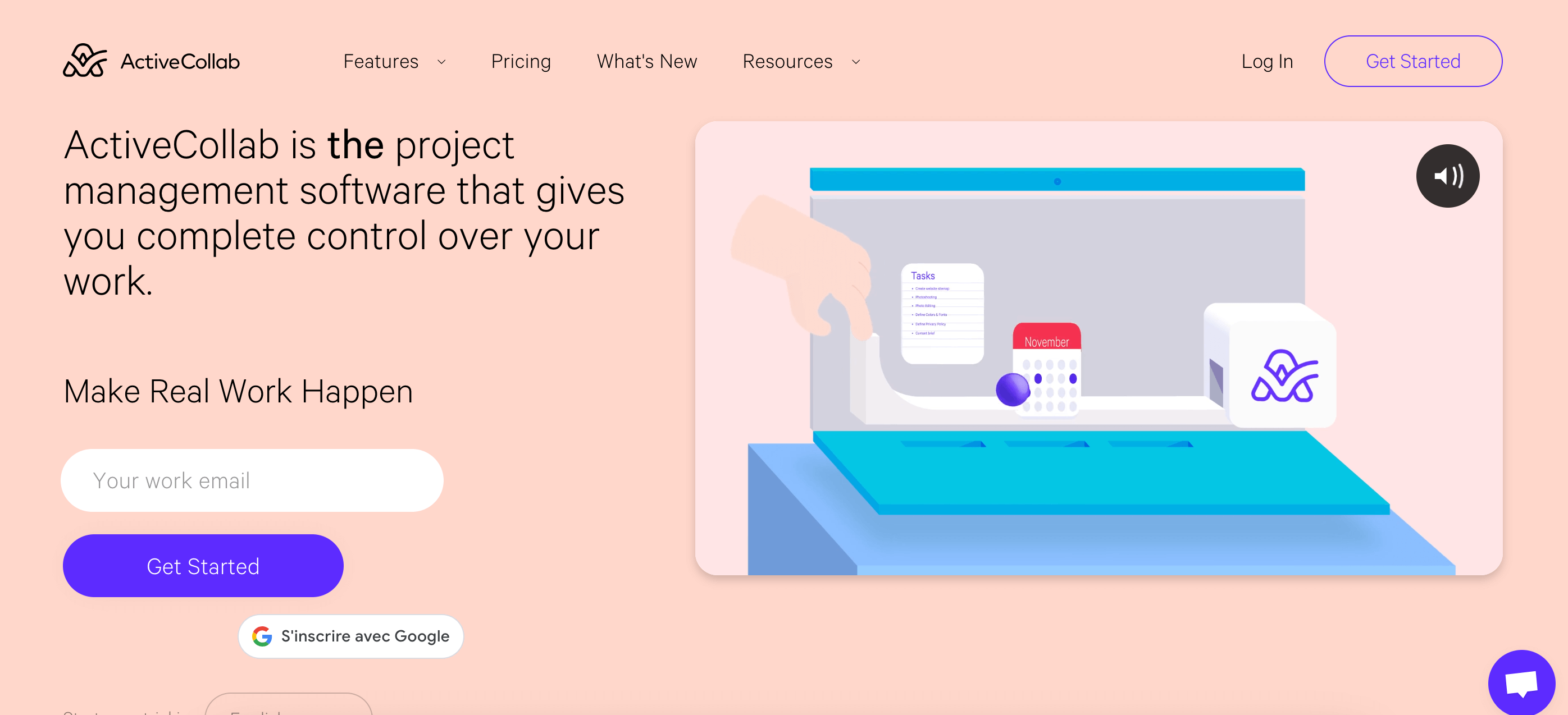
Designed to facilitate seamless collaboration, this robust tool allows our team to streamline workflow and keep all project aspects in check with an array of intuitive features.
With tools for task management, budget tracking, and timekeeping centralized in one accessible location, ActiveCollab transforms the chaotic symphony of construction project details into a harmonious, easily navigable system.
By allowing for real-time communication and updates, it ensures that every team member stays on the same page, regardless of their physical location.
We particularly value how the platform’s flexibility accommodates everything from small-scale renovations to large construction projects, making it an indispensable part of our project management toolkit.
Pros:
- Robust task management and scheduling features to plan every phase of construction projects.
- Integrated time tracking and budgeting tools ensure projects stay on schedule and within financial constraints.
- Real-time collaboration allows seamless communication among team members.
- Versatile reporting capabilities for insights into project performance and resource allocation.
- Customizable interface and workflow that adapt to our specific project requirements.
Cons:
- Initial learning curve for new users to fully utilize all features effectively.
- May be feature-rich for smaller teams or projects, leading to underutilization of its potential.
- Integration with other construction-specific software may require additional setup and fine-tuning.
For who?:
ActiveCollab is ideal for construction teams seeking a centralized project management solution that enhances efficiency and communication.
It’s perfect for project managers, contractors, and stakeholders who deal with multiple moving parts and need a reliable system to manage complex projects with precision.
Whether it’s for overseeing the minute details of a single build or orchestrating the intricate logistics of a multi-site operation, our construction professionals find ActiveCollab’s robust toolset invaluable for staying on top of timelines, costs, and collaboration.
Freedcamp

It offers a centralized platform where we can meticulously plan, execute, and monitor every phase of a construction undertaking.
With its intuitive layout, Freedcamp presents us with a robust suite of features including task assignment, milestone tracking, and time scheduling — all critical for keeping construction projects on course.
What truly distinguishes Freedcamp in the realm of project management software for construction is its ability to blend simplicity with functionality, enabling teams, regardless of their technical prowess, to collaborate efficiently and manage resources effectively.
Its mobile accessibility ensures that we are constantly connected to our project’s pulse, whether on-site or in the office, empowering us with real-time updates and decision-making capabilities.
Pros:
- User-friendly interface that streamlines project planning and team collaboration
- Versatile feature set that accommodates a wide range of construction project needs
- Mobile access which enhances real-time communication and project tracking
- Customizable task lists and dashboard views aligned with specific project requirements
- Free tier available, providing essential tools for small project teams without added expense
Cons:
- Advanced features and larger storage capabilities locked behind paid tiers
- May require a learning curve for teams unfamiliar with project management software
- Integration with external software, while possible, is not as extensive as some competitors
For who?:
Freedcamp is tailor-made for construction professionals and teams who require a versatile project management solution that scales with the size and complexity of their projects.
Whether it’s small-scale contractors aiming to streamline their workflow or large construction companies seeking to enhance project visibility and team synergy, Freedcamp offers a suite of features that can be customized to fit the unique ecosystem of a construction project.
This makes it a suitable choice for those who value a balance between user-friendliness and comprehensive project control.
Wrike
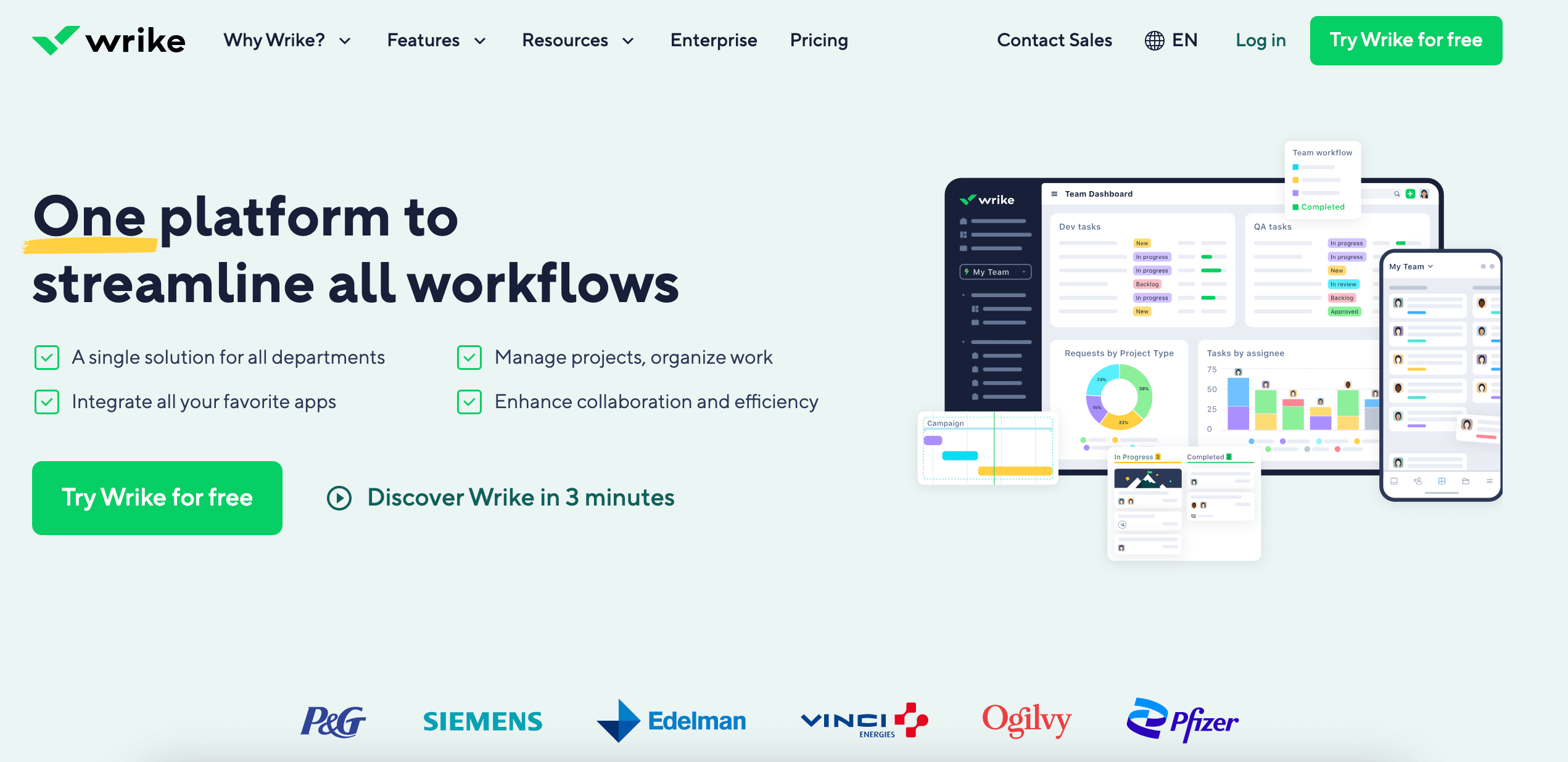
Serving as a central hub for all project details, it allows our team to plan, execute, and monitor construction projects in real-time, enabling unparalleled collaboration amongst crew members, contractors, and stakeholders.
Its intuitive interface couples with powerful customization options, ensuring we adapt our project dashboards and workflows to the unique needs of the construction industry.
Advanced features like Gantt charts, time tracking, and budget management become invaluable tools within our project management arsenal, fostering a disciplined yet flexible approach to complex construction schedules and resource allocation.
Pros:
- Holistic Project Dashboards: Consolidated view of all project elements.
- Real-time Collaboration: Streamlined communication across teams and stakeholders.
- Customization: Tailored workflows and reports to suit construction project requirements.
- Scalability: Capable of handling small to large-scale construction projects with ease.
- Integration Capabilities: Seamlessly blends with other tools, including construction-specific software.
Cons:
- Learning Curve: Might be steep for users new to project management software.
- Cost: Can be on the higher side for smaller teams or projects with a tight budget.
- Complexity: Extensive features might be overwhelming and underutilized by some teams.
For who?:
Our utilization of Wrike is ideal for construction project managers, teams, and any professional responsible for overseeing complex construction projects.
Whether we’re engaged in residential builds, commercial developments, or infrastructure projects, Wrike’s comprehensive toolset aids in maintaining a firm grasp on the project scope, schedule, and budget.
From those needing a high-level overview to team members demanding detailed task management, Wrike is our solution of choice, driving efficiency on-site and beyond.
It is particularly advantageous for teams that benefit from integration with other systems and require a robust platform to manage multiple moving parts inherent in construction projects.
Jira

Tailored initially for software developers, its features are robust enough to cater to construction project management needs.
Affording users a high degree of customization, Jira allows the tracking of project progress through its issue and project tracking functionality.
We can easily break down large construction projects into manageable tasks, link them with dependencies, prioritize, and assign them to individuals or teams.
Its agile framework support, including Scrum and Kanban boards, provides us with an interactive visual representation of all ongoing tasks, enabling an efficient allocation of resources and real-time progress monitoring.
While not originally created as a dedicated project management software for the construction industry, Jira has adapted to support a variety of industry requirements, with plugins and integrations that enhance its utility in managing large-scale construction projects.
Pros:
- Highly customizable dashboards and workflows to match unique project needs
- Enhanced real-time collaboration features to keep all stakeholders in sync
- Agile framework support (Scrum and Kanban) for iterative planning and development
- Comprehensive reporting tools for insightful progress analysis and forecasting
- Integration capabilities with a variety of construction-related software
Cons:
- Steep learning curve for those unfamiliar with agile methodologies or the software itself
- Customization might require advanced understanding, overwhelming for beginners
- Not construction-specific; reliance on add-ons for fuller functionality in the construction sector
- Can be cost-prohibitive for smaller teams or projects due to pricing structure
For who?:
Jira is particularly well-suited for large or growing construction firms that require an adaptive and granular approach to project management.
Our teams, composed of robust staff infrastructures, will find it remarkably beneficial when juggling multiple projects with an assortment of moving parts.
While smaller teams may also leverage the power of Jira, it’s important for us to evaluate the cost against the complexity of the projects we handle.
Additionally, construction managers who are open to adopting modern, tech-driven methodologies will find Jira’s capabilities to align well with future-focused project management strategies in construction.
Paymo
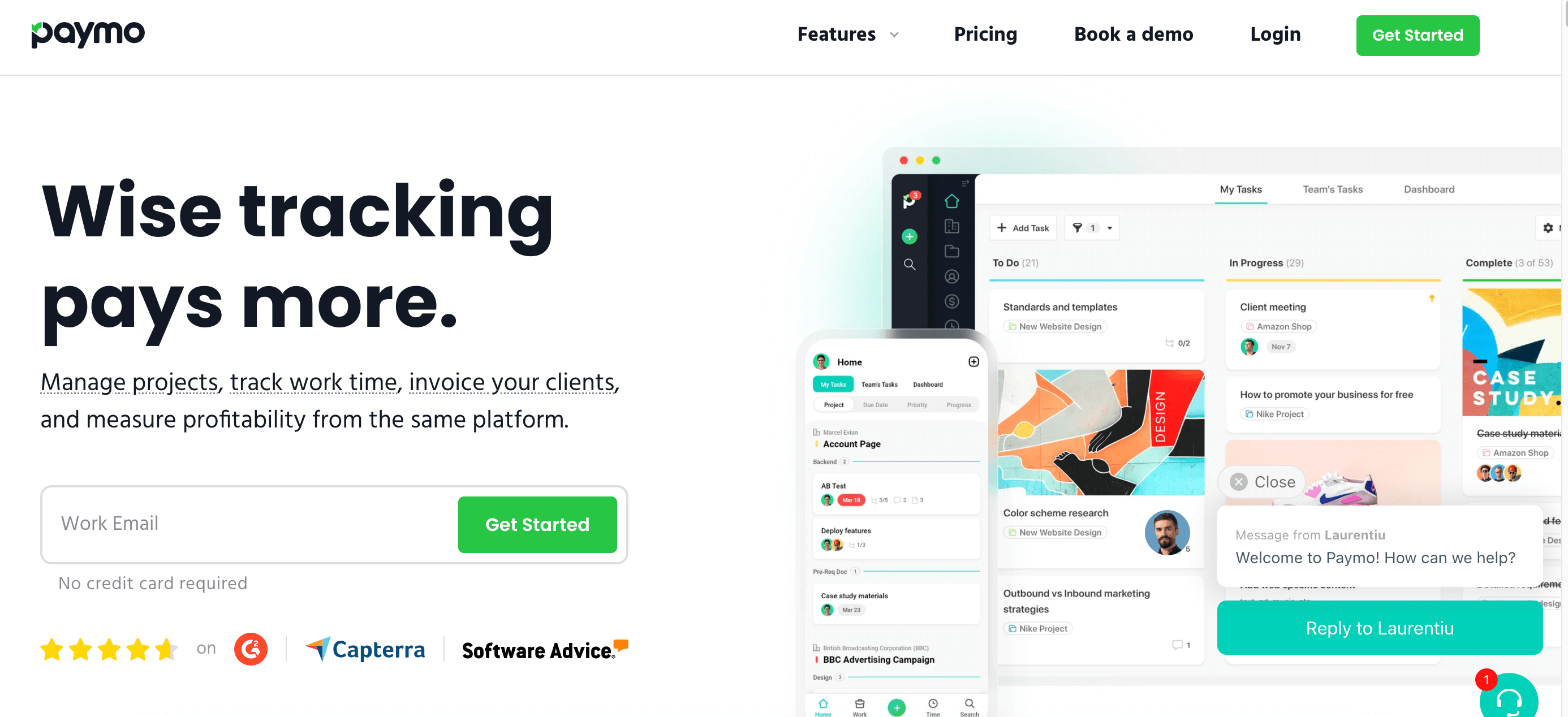
It’s not merely software, but an integrated platform where scheduling, time tracking, task management, and financials converge to offer a seamless project oversight experience.
With its intuitive interface, Paymo ensures that the intricacies of construction projects are managed with ease, enhancing our ability to plan, execute, and deliver on time.
Resource allocation gets significantly more manageable with its Gantt charts, allowing us to visualize the timeline of various project stages.
The tool’s real-time dashboards give us an instantaneous overview of a project’s health, encompassing everything from project progress to team workload, truly a testament to it being tailored for project management in the construction industry.
Pros:
- Integrated time tracking and invoicing features streamline project financial management.
- Task management capabilities allow for granular control over construction project details.
- User-friendly Gantt charts and scheduling tools for effective planning and resource allocation.
- Comprehensive reporting features provide detailed insights for better project decision-making.
- Offers a mobile app, facilitating on-the-go project management for construction professionals.
Cons:
- Potentially steep learning curve for users new to project management software.
- Limited third-party integrations compared to some other project management platforms.
- Advanced features and full benefits may require subscription to higher-tier plans, affecting smaller construction firms with tight budgets.
For whom?:
Our construction management professionals will find Paymo to be an invaluable ally.
Particularly for those aiming to streamline their project delivery process and maintain tight control over project timelines and budgets.
Paymo offers the flexibility required by various roles within the construction sector—whether it’s project managers needing a bird’s-eye view or site supervisors demanding minute task details.
For construction teams prioritizing collaboration, time management, and financial control within their projects, Paymo presents not just a solution, but a partner in building success.
Zoho Projects
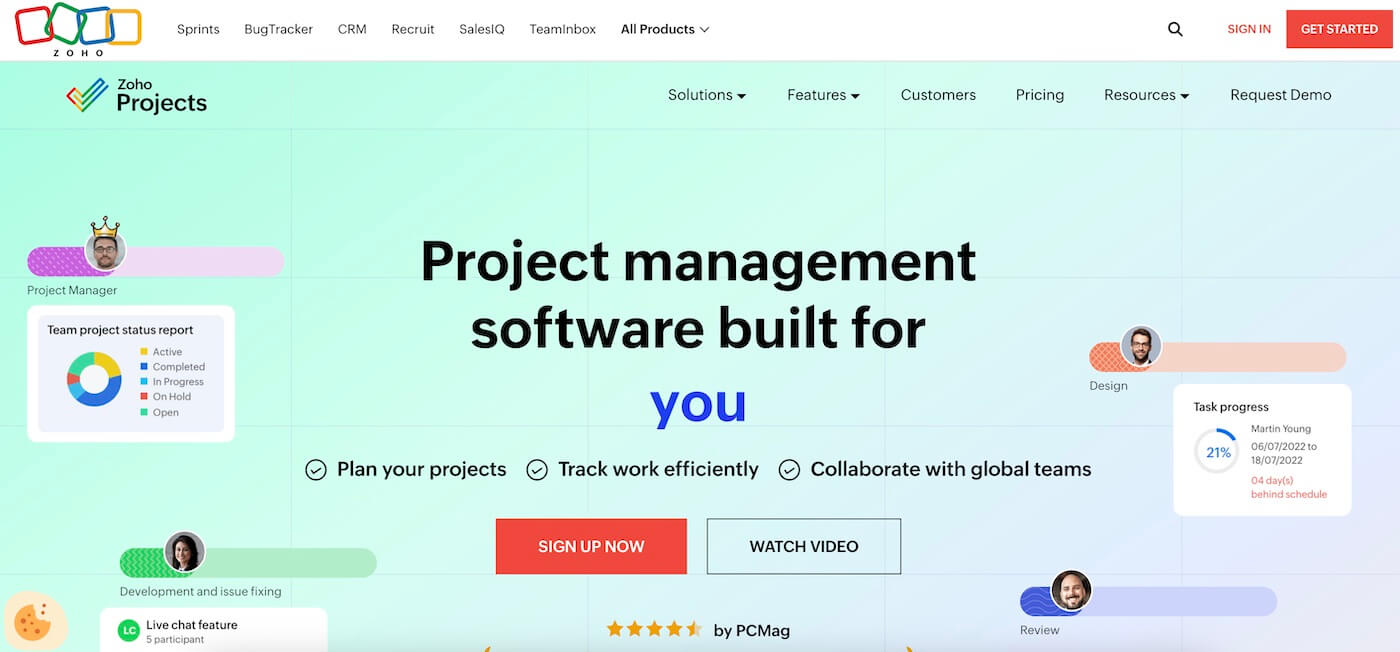
At its core, the platform offers robust task management features, enabling us to meticulously track our progress from conception to completion.
With time-tracking capabilities, Gantt chart analyses, and advanced reporting functions, we are empowered to stay ahead of our deadlines, optimize our resources, and maintain a firm grasp on project timelines.
Furthermore, the software boasts an impressive suite of integration options, connecting us with a multitude of other Zoho apps and third-party services, hence fortifying our arsenal with all the tools necessary to manage construction projects effectively.
It stands out with its tailored solutions, scoring high marks for its adaptability to the ever-changing dynamics of construction project management.
Pros:
- Intuitive task management: Prioritize tasks and set dependencies to efficiently manage construction projects.
- Time-tracking module: Monitor project hours for accurate billing and resource allocation.
- Gantt charts and reporting: Visualize project timelines and generate detailed reports to maintain oversight.
- Extensive integration: Seamlessly connect with other Zoho applications and third-party tools.
- Customizable workflows: Tailor project processes to the unique needs of each construction project.
Cons:
- Learning curve for new users may be steep due to its extensive features.
- Mobile app functionality may be limited compared to the web version.
- Customization options, while powerful, can be complex, requiring a deeper understanding of the software.
For who?:
This solution is ideal for construction project managers and teams seeking a versatile and comprehensive project management platform.
Whether we’re overseeing a small renovation or orchestrating a large-scale build-out, Zoho Projects scales to our needs, offering detailed control over every aspect of our project.
For firms committed to adopting sophisticated digital tools to amplify their project delivery, it presents a solid investment.
Its hefty toolbox is best leveraged by professionals who appreciate data-driven decision-making and seek to enforce a high degree of precision and efficiency in their construction workflows.
Todoist
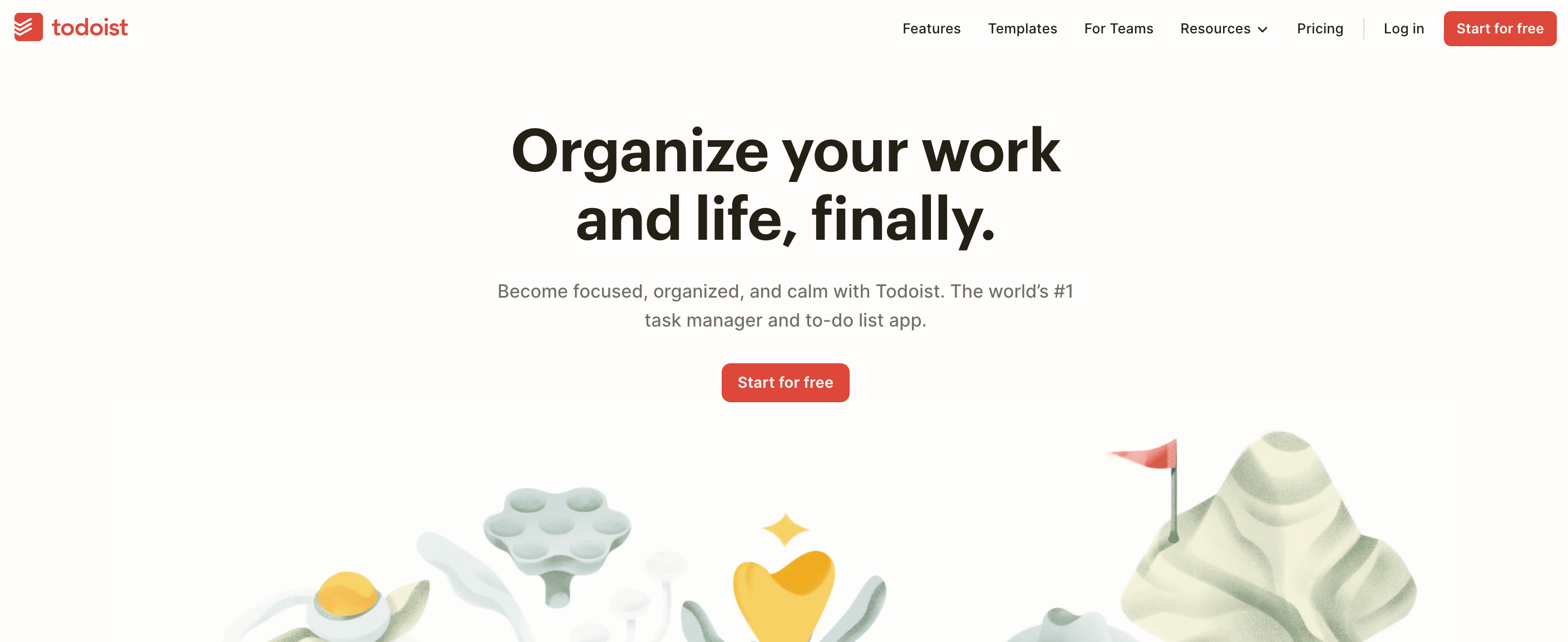
With its intuitive interface, we can effortlessly create tasks, organize them into projects, and assign priorities, thereby ensuring that our most critical construction project deadlines are never overlooked.
The software offers labeling and filtering features, which empower us to categorize tasks related to specific aspects of a construction project, such as procurement, design revisions, and client meetings.
What distinguishes Todoist in the sphere of project management software for construction is its ability to sync across all devices, meaning that we can update project progress whether we’re on-site or at the office.
Todoist’s collaborative features facilitate seamless teamwork, making it easy for us to share tasks and communicate about project statuses with all stakeholders involved.
Pros:
- Intuitive user interface that streamlines task organization and prioritization
- Cross-platform synchronization ensures task lists are always up-to-date, regardless of the device used
- Effective task labeling and filtering boost project sorting and retrieval
- Collaborative capabilities that enhance communication and shared productivity
- Scalability to accommodate projects of various sizes, befitting small teams or larger construction projects
Cons:
- Lacks industry-specific features like Gantt charts, which are often preferred in construction project management
- Limited to task management, without built-in tools for comprehensive project tracking like budgeting or timesheet functionalities
- Absence of offline functionality may hinder real-time updates in locations with poor internet connectivity
For who?:
Ideal for construction teams that prioritize task delegation and straightforward project milestone tracking, Todoist is a match for professionals in need of a user-friendly and synchronized task organization tool.
It serves well for teams who may already utilize other construction-specific project management software but require an additional streamlined, mobile-friendly platform for task management on the go.
While Todoist might not encompass the robustness required for intricate construction timelines alone, it serves as a complementary tool, benefitting project managers, site supervisors, and construction personnel who prize organization and the collaborative execution of project tasks.
Smartsheet
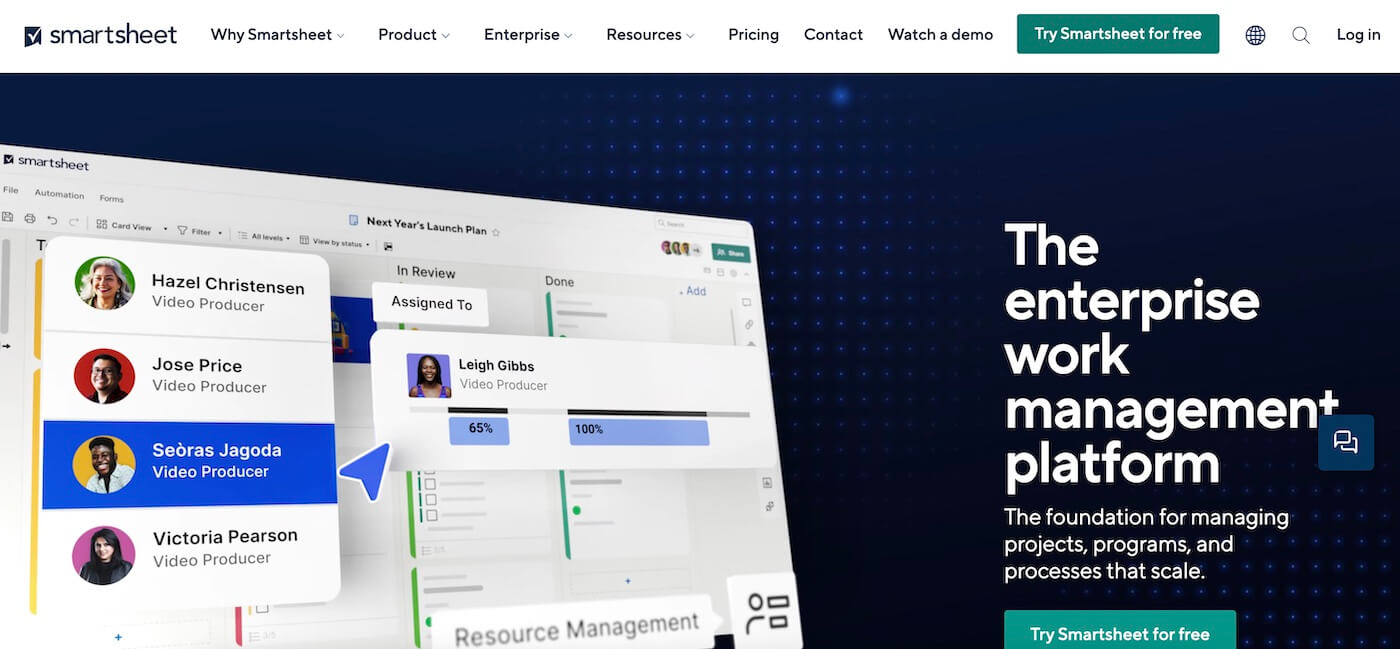
At its core, Smartsheet is an all-encompassing platform that marries the familiarity of a spreadsheet interface with the robust functionality of project management essentials, such as task assignment, scheduling, and collaborative document sharing.
It elevates our ability to streamline workflows by offering real-time visibility into project progression, thus fostering prompt decision-making and accountability among team members.
Smartsheet’s integration with a variety of apps and third-party solutions adds an additional layer of customization and efficiency to our construction management processes, ensuring that all the moving parts of a construction project are in perfect sync.
Pros:
- Real-time updates allow for instant visibility and better project tracking.
- Customizable templates and fields to suit a variety of construction project needs.
- Integration capabilities with leading apps and services, enhancing its utility.
- Scalability for construction projects of all sizes, from small renovations to large developments.
- Automated workflows and reminders to improve team productivity and reduce manual errors.
Cons:
- May have a steep learning curve for users not familiar with spreadsheet-like interfaces.
- Higher cost compared to some other project management tools, which might be prohibitive for smaller firms.
- Some users may find the advanced features overwhelming and underutilized in smaller projects.
For who?:
Smartsheet is the ideal project management software for construction firms that crave a balance between granular control over their projects and the agility of cloud-based collaboration.
It is particularly beneficial for project managers and teams who are already comfortable with spreadsheet functionalities but require a more powerful tool to handle complex, resource-intensive projects.
The software’s scalability makes it a strategic choice for construction businesses poised for growth and those managing multiple projects simultaneously who can leverage its extensive features to ensure no detail is left unattended.
Trello

At its core, Trello utilizes a system of boards, lists, and cards to represent projects, tasks, and details, respectively.
We are particularly fond of its drag-and-drop interface which mimics the experience of manipulating physical cards on a bulletin board but with the power of digital flexibility.
Its customization capabilities allow us to create workflows that mirror our construction project phases, while integrations with apps and services add rich functionality.
Plus, its real-time updates enable our team to stay in sync no matter where they are, which is essential on scattered construction sites.
Pros:
- Intuitive user interface that simplifies the learning curve for all team members
- Customizable boards that can represent the unique stages of construction projects
- Offers real-time collaboration, ensuring team members have up-to-the-minute updates
- Ability to integrate with other tools, offering a centralized platform for project management
- Features like checklists and due dates enhance task-tracking capabilities
Cons:
- Limited functionality for in-depth reporting, which can be critical for construction project oversight
- May not scale well for very large projects with hundreds of tasks, as boards can become cluttered
- Lacks time-tracking features natively, an essential aspect of construction project management for some teams
- Offline access is limited, potentially impacting on-site productivity
For who?:
Trello is suited for construction teams seeking a straightforward, yet flexible project management solution.
Whether we are overseeing a small renovation project or orchestrating multiple subcontractors for a large build, Trello can streamline our task management process.
It is ideal for those of us who prioritize a high level of visual project oversight and collaboration but don’t require the complexity of more specialized construction project management software.
For construction professionals who are often on the move and need to quickly adapt to changing project scopes and sequences, Trello presents an agile and adaptable option.
What Are The Main Features Of Project Management Software For Construction
When we look at project management software for construction, we typically identify several vital features that stand out.
Task scheduling and tracking capabilities are essential, as they enable us to keep construction projects on time and manage staff effectively.
We also find that document management becomes a breeze, letting us store and access blueprints, contracts, and change orders on the fly.
Furthermore, effective communication is facilitated through real-time collaboration tools, improving coordination between the office and field team.
Additionally, resource management tools help us allocate equipment and materials efficiently, preventing waste and reducing costs.
Financial management features, including budgeting and invoicing, assist us in keeping accurate financial records.
For example, using a solution like Procore or Autodesk Construction Cloud can greatly simplify complex project cost tracking.
Finally, a customizable reporting function is invaluable for us to generate real-time reports on project progress and financial health, ensuring stakeholders are always in the loop.
You’ll also like: Top 10 Project Management Software For Writers
What Is Project Management Software For Construction?
We rely on project management software for construction to streamline our building projects, ensuring that we stay on schedule and within budget.
This specialized software aids in planning, coordinating, and controlling construction projects, from residential builds to large-scale commercial endeavors.
Key features often include task assignments, document management, and real-time communication tools, which are essential for us to keep every team member on the same page.
For instance, when we use software like Procore or Buildertrend, tracking project progress and managing resources becomes significantly more efficient, mitigating risks and preventing costly delays.
By integrating critical data and workflow onto one platform, we make informed decisions quickly, enhancing the productivity and accountability of our team across every project stage.
Read also: Top 11 Project Management Software For Artists
How Much Does Project Management Software For Construction Cost?
When we look into the costs of project management software for construction, it’s essential to consider various factors that can influence the price.
Generally, prices can range anywhere from $15 to over $100 per user, per month for subscription-based models.
However, for more sophisticated enterprise-level solutions, costs may escalate significantly, with some systems requiring an up-front investment ranging from a few thousand to tens of thousands of dollars, plus ongoing maintenance fees.
It’s important to compare the features and capabilities of different software, like Procore or Buildertrend, which offer comprehensive project management tools tailored for construction workflows.
Always look for systems that integrate well with existing processes and offer scalability, as this can greatly affect long-term value and efficiency.
You’ll also like:












